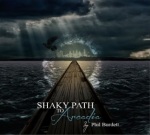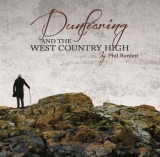 Every time I hear some delusional, no-talent wannabe on a TV talent show (not often, I admit) it should make me despair for music in the twenty-first century. The reason it doesn’t is that I know about people like Phil Burdett, a genuine visionary who’s about as far as it’s possible to get from the epicentre of what masquerades as the music business today. When I interviewed Phil about eighteen months ago in downtown Leigh-on-Sea, he told me that he was working an album to follow “Dunfearing and the West Country High” as the second part of the “Secular Mystic Trilogy”. Not only that but he was also working on another trilogy that would begin with “Humble Ardour Refrains”. So, on a budget of threepence-halfpenny and some lollipop sticks, he’s recorded two albums for Drumfire Records with some fabulous musicians from the Southend and Canvey area (more about the musicians later) and he’s releasing both of them at the same time.
Every time I hear some delusional, no-talent wannabe on a TV talent show (not often, I admit) it should make me despair for music in the twenty-first century. The reason it doesn’t is that I know about people like Phil Burdett, a genuine visionary who’s about as far as it’s possible to get from the epicentre of what masquerades as the music business today. When I interviewed Phil about eighteen months ago in downtown Leigh-on-Sea, he told me that he was working an album to follow “Dunfearing and the West Country High” as the second part of the “Secular Mystic Trilogy”. Not only that but he was also working on another trilogy that would begin with “Humble Ardour Refrains”. So, on a budget of threepence-halfpenny and some lollipop sticks, he’s recorded two albums for Drumfire Records with some fabulous musicians from the Southend and Canvey area (more about the musicians later) and he’s releasing both of them at the same time.
“Shaky Path to Arcadia” carries on where its predecessor left off, looking west towards the USA from Cornwall, but it’s a metaphorical and musical destination and it’s not the only direction the album goes in, geographically or temporally, before returning to Cornwall to complete the cycle. Without slipping in to ‘sixth-form-literary-criticism’ mode, I’m going to say that there’s a lot going on lyrically and the deeper you dig, the more precious stones you’ll unearth. The lyrics are strewn with references to American music and culture; there’s no mistaking the reference point for “Christmas in Casablanca”, but elsewhere there are references to Joe Hill, Billie Holiday, Dylan, Little Richard and many, many more. There are Dadaist references, travel references (trains, boats and buses and almost a plane) and if you look really closely, a lot of references to Basildon. There’s a lot of autobiography in there, but you need to know where and how to look.
Even without the lyrical content, you could listen to the album and be enthralled by Phil’s rich, powerful vocals and the performances of the band over a wide range of styles. From the mainly acoustic opening song, “Returning to Earth” to the counterpoint vocals in the coda of the album’s closer “I Dreamed I Saw Carl Wilson Last Night”, the band sounds superb. It’s ensemble playing at its finest; particularly on “Hellbound & Innocent” where a melodic bass line from Russ Strothard, an insanely catchy clipped John Bennett guitar hook and Jack Corder’s drums recreate the clickety-clack of the train on the track to perfection. Dee Hunter’s piano is the perfect foil for Phil’s voice on the haunting “Christmas in Casablanca” while Steve Stott’s fiddle on “Come Out Without a Hat (It’s Bound to Rain)” and “New Greyhound Rag” give an authentic country/bluegrass feel to the songs. And let’s not forget Colleen McCarthy’s lovely backing vocals and producer Mark Elliott’s esoteric samples.
“Shaky Path to Arcadia” is an example of how good an album can be when it’s put together by people who love what they do and they do it very, very well. Put the players together with another superb set of songs from the polymath poet of Westcliff-on-Sea and you’ve got a very fine album indeed. Any proper record collection should have some Phil Burdett in it and this is as good a place as any to start. “Humble Ardour Refrains” coming soon.
“Shaky Path to Arcadia” and “Humble Ardour Refrains” are both available to pre-order now from Drumfire Records.
 What a great start we’ve had to 2014. We’ve already reviewed some cracking albums in various genres and now we’ve got another. “Dunfearing and the West Country High” is Phil Burdett’s first album to be released on Twickenham-based Drumfire Records and it’s very, very good. If you’ve seen Phil Burdett play live, you’ll know that he has a powerful, rich baritone voice and is an accomplished acoustic guitar player. He learned to play at the age of six, was in a pre-Depeche Mode band with Martin Gore and has pursued a winding and sometimes messy path through the music scene in the south-east of England ever since.
What a great start we’ve had to 2014. We’ve already reviewed some cracking albums in various genres and now we’ve got another. “Dunfearing and the West Country High” is Phil Burdett’s first album to be released on Twickenham-based Drumfire Records and it’s very, very good. If you’ve seen Phil Burdett play live, you’ll know that he has a powerful, rich baritone voice and is an accomplished acoustic guitar player. He learned to play at the age of six, was in a pre-Depeche Mode band with Martin Gore and has pursued a winding and sometimes messy path through the music scene in the south-east of England ever since.
It’s obvious from the first listen that Phil isn’t just a songwriter; he’s a true poet. You can find any number of musical influences listed in previous reviews but you should probably add James Joyce and Dylan Thomas to that list. A quick word of advice here, don’t download this album, buy the CD; the packaging, designed by Fish Inton, is gorgeous and contains a booklet full of evocative photos and all of the lyrics.
It’s usually a pretty easy job to explain the subject of a song, but it can be a real challenge on “Dunfearing…” as Phil slips sinuously between the mundane and mystical. Even a song as seemingly grounded as “Small Talk at Sullivan’s Diner” descends quickly from the simple narrative to a deeper and darker examination of tortured souls struggling to cope with real life. The songs with a clear narrative thread are inspired by the history of Cornwall and the West Country, “Gothic Miner” and “Fate of Pirates”, for example, while “New York City Call” and “Columbus and Hope” emphasise the area’s historical links with the New World. There’s a batch of songs (“First and Last”, “Song of the Lamp”, “See the Sunset Slow and Beckon True”, “Rimbaud’s Ghost, Chapel Street & Union” and “Winter Halls”) which take inspiration from Phil’s recent Cornish sojourn, and the fatalistic “It’s Where ye Have to Go”.
Which leaves the album’s closing song, “Night Horses of the Wireless Road” to take all of these strands and pull them into an epic, mythical, stream of unconsciousness. The entire album is lyrically dense (both in volume and meanings) and the final song typifies this with references to art, music and fables, before moving abruptly into harsh reality with the news of the death of Jackie Leven, to whose memory the album is dedicated. Musically, “Night Horses…”, has echoes of Neil Young with Crazy Horse at their most laid back or maybe even John Martyn at his best. It has the same unsettling, alienating effect as The Afghan Whigs’ 1996 album, “Black Love”, particularly the closer, “Faded”.
I’m not saying this is an easy listen, but it’s worth putting in the effort. You might even have to do a bit of research on phrases like “mise-en-abyme” (you can look it up for yourself) and some of the more obscure references. Phil’s rough-hewn baritone voice and acoustic guitar (with a hint of Johnny Cash at times) are sympathetically supported by John Bennett (guitars), Steve Stott (mandolin/fiddle), Russ Strothard (bass guitar), Jack Corder (drums), Dee Hepburn (piano), Colleen McCarthy (backing vocals), Wag Porter (fiddle) and Mark Elliott (percussion) throughout the album; the playing isn’t particularly showy, but it creates a perfect backdrop for the modern folk and slight country leanings of the songs.
If you want a particularly geeky fact to impress your friends with, there are nearly thirty drinking references in the album’s lyrics, including pub names, drink names and general drinking terms, including one reference to rehab; you can take what you like from that, but I’m guessing that Phil enjoys a beer. This is an album which visits some very dark places, but closes with a heartfelt farewell to a fellow troubadour as part one of the proposed “Secular Mystic Trilogy” closes.
Out Monday March 3rd on Drumfire Records (DRMFR016).


